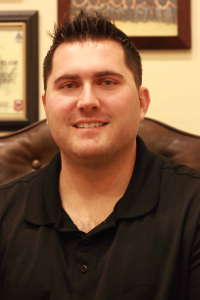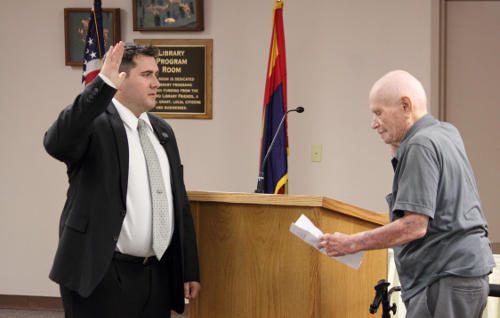Part two: Redemption and return to service
By Eric Burk
In part one of this series, we learned of former football player and Army combat veteran Chris Taylor’s spiral into opiate addiction, including succumbing to heroin use. Part 2 examines how he managed to change his life and those around him for the betterment of the community.
SAFFORD – Chris Taylor’s life collapsed in Safford after he succumbed to opiates, and when his parents kicked him out, he went to live in Phoenix with his brother in September, 2011. He sought help at the Phoenix Department of Veterans Affairs (VA), but became a victim in the VA scandal that would erupt in 2014, and was not given an appointment with a mental health doctor until nine months after his original request.

Eric Burk Photo/Gila Valley Central: Chris Taylor at Desert Eagle Addiction Recovery.
Finally, in 2012, Taylor was admitted to a renowned trauma program in Palo Alto, Calif. Before he was admitted to the program, he had emergency surgery at a hospital for an infection in his arm from a needle he had used. While hospitalized and off narcotics, his mind began to clear.
Taylor remembered the teachings of the Church of Jesus Christ of Latter-day Saints and the hope that he had in Jesus. He remembered wanting to be a father to a strong family, and he knew he could be more than an addict. Taylor got down on his knees and prayed, “I can’t do this, and if you’re there for me, I really need you.”
“I remember feeling almost immediate relief, and that this burden was lifted off me,” Taylor said. “I remember feeling so good for the first time in so many years.”
Taylor believes Jesus took on all the pain that was trapped inside him, and gave him the ability to change.
Taylor was released from the hospital and went to the recovery program, where he was forced to confront the nightmares and emotions that he had been numbing. With the support of other veterans and the staff, he successfully graduated the program in 95 days.
Taylor moved back to Safford, and the GI Bill paid for him to attend Eastern Arizona College. There, he met his wife, Sarah, and they worked to increase their involvement in their church, working for the dream of a faith-focused family. A year later, they had a baby girl and named her Jordan.

Contributed Photo/Courtesy Chris Taylor: The Taylor family, from left, Sarah, Jordan and Chris.
A critical part of addiction recovery is being positively involved in the community.
“Community service distracts from self focus,” Taylor said. He noticed a lack of resources for addicts and decided to do something about it.
Arizona has facilities for treatment, but, with no real oversight, they are often ineffective or even predatory, just seeking money. As part of his own rehab, Taylor set out to protect those seeking help. He used his experience and connections to build a list of trustworthy organizations with real results. He also worked to provide an ongoing support system for those who return from such programs. The result is Desert Eagle Addiction Recovery, which Taylor founded in 2014 and is its president and CEO.
Taylor uses an individualized approach, meeting frequently with clients. He requires them to cut old ties with people who threaten their new-found sobriety. He also emphasizes immediate involvement in productive work, using the trust he’s built locally to gain employment for his clients.
More than 100 people have sought Taylor’s help in the past two years, and he said a majority of them are succeeding, although an individual’s success is dependent on their own motivation. Taylor emphasizes that Desert Eagle Addiction Recovery not only serves his clients, but also helps him maintain his sobriety as well. “Everything I do is more therapeutic for me than I can even explain,” he said.
Another key to his recovery is his civic involvement. In addition to his business, Taylor is a member of the Rotary Club, the Safford Lions Club, is the chair of the recovery branch of the Substance Abuse Coalition, and, in May 2015, he realized a childhood dream of becoming a Safford firefighter. But Taylor did not stop there.

Contributed Photo/Courtesy Chris Taylor: Chris Taylor continues the family legacy of firefighting.
On Monday night, his grandfather Dick Bingham swore Taylor in to be a new Safford City Council member. Taylor said he wants to use his position to help de-stigmatize addiction. When he first shared his idea to run for city council, not everyone saw him as a serious candidate. People told him, ‘You can’t do this yet, you need to be clean for 10 years, or 20 years.’ Taylor disagreed. “When you change your life, you change your life,” he said.
Careful to not hide from his past, Taylor worked to erase the stigma of addiction through his platform as a candidate. Without polls, Taylor had few metrics to gauge his progress. By relying on his civic experience in the Afghan villages, Taylor worked hard and surprised himself by earning the most votes on election night.
“It was unreal, because I had no idea,” he said.
Taylor has the same goals for his time in office as for his business. He wants three things: to be more effective at cracking down on high-level dealers and helping users; to make addiction treatment more available and affordable and to erase the stigma of addiction.
“Addiction is not a moral failing,” Taylor said, adding that many people do not initially seek drugs for fun or rebellion, but instead come to drug abuse from legitimate injuries or other sources of trauma.
Family is critical for Taylor. Without strong role models like his grandfather and his father, Taylor would not have seen any of this success.
“My father, Tim Taylor, has been the biggest positive influence in my life,” he said. “Without my entire family, I would still be lost.”
Although he still struggles with nightmares and other PTSD symptoms, Taylor has learned to resort to healthy coping mechanisms. Taylor says Jesus died not only to take away sins, but to take away the burdens of this life. Every morning he reminds himself to let go of his burdens.
“I have to wake up and be willing to give that away to Him, because if not, you can fall back very very quickly,” he said.
Taylor also remembers his dream from the California hospital.
“When I see my daughter and my wife, that’s what I always wanted; just a beautiful family that I could support, provide for, protect and raise the same way I was raised.”













